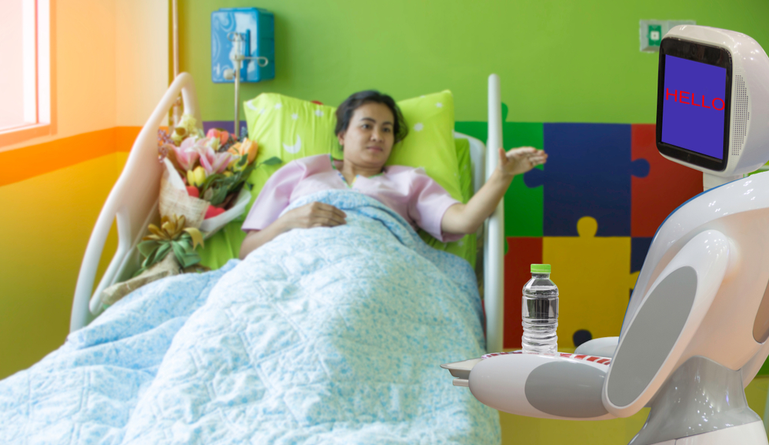Robotic nurses are real. Much like the AI that powers the digital assistants that help people navigate their calendars, banking, music, and even order products online, elderly care robots have been touted as the future of helping an older population.
The generation that is retiring is growing. With a growing aging population comes increasing medical care and costs associated with that. Not only is there a current shortage of qualified medical personnel who specialize in geriatric issues, but elder care is also increasing in cost, like most other medical services, and the cost associated with elder care is burdensome for both those receiving care and their families. One robotics company notes, “ population problem is already very real in countries like Japan, where there will be an estimated shortage of 1 million caregivers by 2025. The U.S. is facing a similar dilemma — as the percentage of people aged 65 or older is expected to rise to roughly 26% by 2050,” going to say that the average cost of a room at a retirement community in the United States can be an average of almost $100,000 per person per year.
3 Ways Robots Are Useful for Care of the Elderly
Care robots may hold a solution. One New Zealand article notes that the driving purpose behind this technology is, “to enhance the opportunity of mobility and promote independence.” What other ways can robotic care help improve the lives of patients?
Reduced loneliness
The social element of health is very real and very significant. Loneliness can lead to reduced immune response, which can increase the risk of cardiovascular disease, elevated blood pressure, cognitive decline, and greater risk for infection. Elderly populations are some of the most isolated, increasing their risk for any of these health problems. Certain robots have already been developed to play a social role at home – unlike an Alexa, a robot like Jibo was designed to do more than just tasks. Jibo can sing, dance, offer suggestions, take pictures, and more to help create a sense of connection. In fact, it’s so sophisticated that it can identify 16 distinct people and interact with them in unique ways. More advanced technology similar to this could allow for social and mental in interaction with elderly users that can lead to better moods and better health.
Increased physical health
Elderly care robots might be limited in their medical expertise at the moment, but they have the potential to help remind patients to take their medication, interface with databases to assess symptoms and emergencies, and even assist with lifesaving care in the event of an emergency. As AI tech can learn, care robots could be designed to track vital signs like pulse and temperature and communicate with a staff of live medical experts who can monitor the health and make recommendations or medication adjustments without having to see a patient in person, saving time and resources.
Enhanced independence
Certain age-related diseases like arthritis or limited vision can lead to reduced individual independence and more reliance on someone else to help get medicine, assist with dressing, and help get around the house. A robotic assistant has the potential to work with elderly patients by helping bring them medication or assist in mobility.
Robots in the medical field may not be the immediate solution in every home, but the technology is promising and may help to decrease the stress associated with medical costs and time investment that is often linked to elderly care. As tech companies continue to innovate and social and medical agencies continue to problem solve the upcoming caregiver shortage, more focus should be paid to how elderly care robots can be developed as a real and long-term service solution to the elderly patient population.





